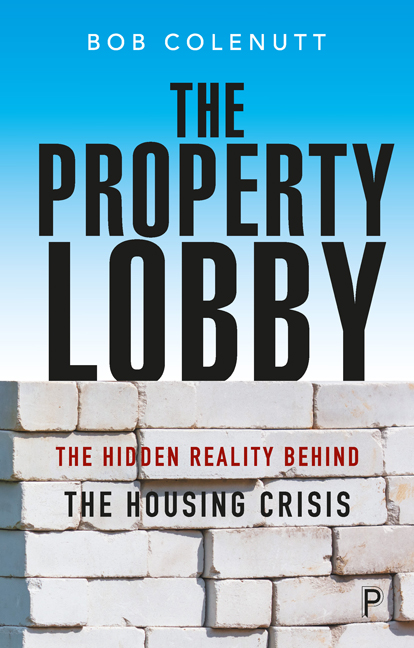Book contents
- Frontmatter
- Dedication
- Contents
- Acknowledgements
- Preface
- 1 The Finance–Housebuilding Complex
- 2 The Housing Shortage
- 3 The Housebuilding Business
- 4 Financing Housing Investment
- 5 The Property Lobby
- 6 Shaping National Housing and Planning Policy
- 7 The 2008 Financial Crash Continues
- 8 The Housebuilders and Affordable Housing
- 9 How the Social and Affordable Housing Sectors Got Swallowed
- 10 Local Case Studies
- 11 Unblocking the Impasse
- Postscript
- Notes
- References
- Index
- Frontmatter
- Dedication
- Contents
- Acknowledgements
- Preface
- 1 The Finance–Housebuilding Complex
- 2 The Housing Shortage
- 3 The Housebuilding Business
- 4 Financing Housing Investment
- 5 The Property Lobby
- 6 Shaping National Housing and Planning Policy
- 7 The 2008 Financial Crash Continues
- 8 The Housebuilders and Affordable Housing
- 9 How the Social and Affordable Housing Sectors Got Swallowed
- 10 Local Case Studies
- 11 Unblocking the Impasse
- Postscript
- Notes
- References
- Index
Summary
The stranglehold of the finance– housebuilder complex over housing and planning is not just taking place remotely at a national level; it directly intrudes into local planning decision- making in your city, town and neighbourhood. Almost every major local planning decision about housing and development is influenced by the bigger picture of the business model of the housebuilders and landowners, and by government (and local government) dependency on it.
Oxford North
This first case study focuses on a single planning application in the city of Oxford, a local authority in the South East of England under intense pressure to provide more affordable housing. It traces how the pressures of the finance– housebuilding complex come together to influence day- to- day plan making and development control decisions at a local level. The Oxford North scheme is a large mixed- use development not unlike many housing developments promoted by local authorities and landowners across the country.
Oxford has been described as the least affordable place in the UK. In 2018, average house prices, at £435,000, were 17.5 times the average incomes of Oxford residents. There are 3,300 households on the housing waiting list and 100 households each month presenting to the council as homeless and requiring assistance. The city estimates that it needs 24,000– 32,000 additional homes between 2011 and 2031 but there is space for only 7,500 within the city boundaries. In other words, it is a city bursting at the seams and desperately short of social and affordable housing.
With the city constrained by its boundaries and surrounding green belt, and with a booming economy, land and property are at a premium. It should be a circumstance where the local authority has extraordinary leverage over developers and landowners in the content, design and affordable housing planning obligations of development schemes. There is surely enough rising land value to require a high level of affordable housing obligations to be met without harming landowner or developer profits.
However, this is far from the full story. Housing development in Oxford is controlled largely by university landowners and student housing landlords. The largest landowners (and the wealthiest) in the city are the Oxford colleges and Oxford University itself.
- Type
- Chapter
- Information
- The Property LobbyThe Hidden Reality behind the Housing Crisis, pp. 131 - 140Publisher: Bristol University PressPrint publication year: 2020

